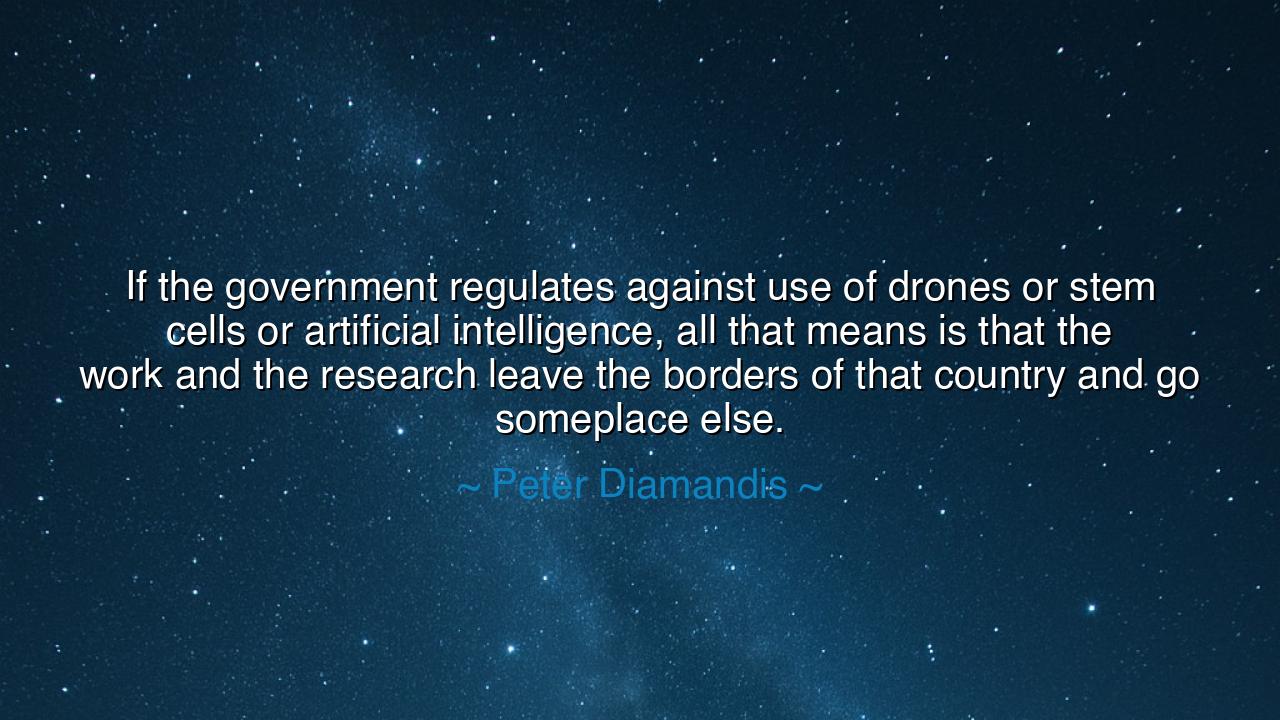
If the government regulates against use of drones or stem cells
If the government regulates against use of drones or stem cells or artificial intelligence, all that means is that the work and the research leave the borders of that country and go someplace else.






Hearken, children of curiosity and seekers of wisdom, and attend to the words of Peter Diamandis, who proclaimed with incisive clarity: "If the government regulates against use of drones or stem cells or artificial intelligence, all that means is that the work and the research leave the borders of that country and go someplace else." In this reflection lies a profound truth about innovation, freedom, and the unintended consequences of overregulation. Diamandis warns that knowledge and creativity are restless forces, unbound by walls or decrees, and that to stifle them within one land is to see them flourish elsewhere.
The origin of Diamandis’ insight rests in the observation of scientific and technological advancement across human history. Research is an endeavor of curiosity and ingenuity, and when governments impose strictures that restrict experimentation, they inadvertently drive progress beyond their reach. This principle echoes the timeless wisdom of the ancients: knowledge is migratory, and creativity will seek fertile soil wherever it may flourish. Restriction does not extinguish invention; it merely redirects it.
Consider the imagery of borders and barriers. A nation that binds innovation with chains of regulation cannot halt the march of human discovery. Drones, stem cells, artificial intelligence—these are instruments of progress, capable of transforming societies and improving lives. When constrained in one land, the pioneers of these fields carry their genius to regions more hospitable, ensuring that the benefits of discovery are realized elsewhere, while the restrictive nation suffers stagnation and loss of competitive advantage.
History provides vivid exemplars of this principle. In the 20th century, European scientists fleeing oppressive regimes brought their discoveries in physics, chemistry, and medicine to the United States, propelling American leadership in science and technology. The exodus of talent was a consequence of restrictive policies, persecution, and stifling of intellectual freedom. Diamandis’ warning mirrors this historical truth: progress seeks freedom, and those who hinder it risk being left behind.
Diamandis’ reflection is also a meditation on the balance between regulation and innovation. While laws are necessary to protect society, excessive or poorly considered restrictions can repel ingenuity, drive economic opportunity abroad, and deprive a nation of transformative advances. The wise leader, he implies, is one who cultivates both safety and freedom, ensuring that governance does not suffocate the very forces that bring growth, knowledge, and prosperity.
The lesson is eternal: to nurture innovation, one must provide freedom, support, and opportunity. Inventors, scientists, and visionaries thrive where curiosity is respected, where exploration is rewarded, and where the seeds of experimentation are allowed to take root. Societies that understand this principle attract talent, foster creativity, and secure lasting advantages, while those that restrict innovation invite stagnation and obsolescence.
Practical actions emerge naturally: support policies that balance ethical oversight with freedom for experimentation; cultivate environments—be they educational, corporate, or civic—that empower innovators; invest in research and development; and advocate for systems that encourage creativity rather than stifle it. By doing so, citizens and leaders alike ensure that knowledge and invention flourish within their borders, rather than being exported to those who offer freedom and support.
In sum, Diamandis’ words illuminate a profound truth: innovation cannot be imprisoned, and genius will seek the lands that welcome it. Let this lesson guide policymakers, educators, and entrepreneurs, so that human curiosity is harnessed, nurtured, and celebrated, producing discoveries that enrich society and elevate civilization. In respecting the freedom of thought and experimentation, a nation secures both its present vitality and its future greatness.
If you wish, I can craft an even more epic, mythic version, turning Diamandis’ reflection into a heroic narrative of the pursuit of knowledge, the flight of genius, and the transformative power of freedom—perfect for immersive audio storytelling. Do you want me to do that?






AAdministratorAdministrator
Welcome, honored guests. Please leave a comment, we will respond soon